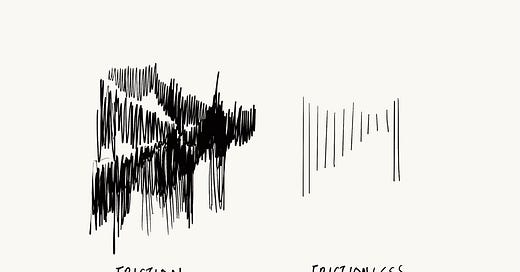Are we less able to deal with life’s frictions?
Friction makes us feel – and that’s the key to building deep trust
Dear Rethinkers,
Early this week, I stood in line at the supermarket waiting to use the self-service checkout when a man in front of me started swearing at the machine. When that didn't work, he hit it. "Please wait for the service agent," the screen continuously pinged. I admit I sometimes get annoyed when this happens; it is “self-service" after all. However, he was buying a 3L bottle of Vodka that required ID verification. Fair play to the checkout.
In our everyday lives, our threshold for waiting has declined. A slow-loading website, a delayed flight or food delivery, or simply waiting in line. Little things can leave us annoyed, frustrated and, at times, completely unreasonable (like hitting a machine). Has getting answers, information, food – you name it – quickly made us less able to deal with life's friction?
The more technology eliminates friction from our everyday lives, the more intolerant of friction we become.
Over the past few decades, eliminating friction has become an obsession with the tech industry. The gospel for many designers is that many create experiences that are fast, convenient, and efficient. No need to wait (or think); just swipe, click or shout loudly at Alexa. But here's the thing: the less everyday friction we face, the more fragile we become.
Read on to find out why the constant quest for frictionless design is a problem – and how we can introduce meaningful friction in our lives.
Keep reading with a 7-day free trial
Subscribe to Rethink with Rachel to keep reading this post and get 7 days of free access to the full post archives.




